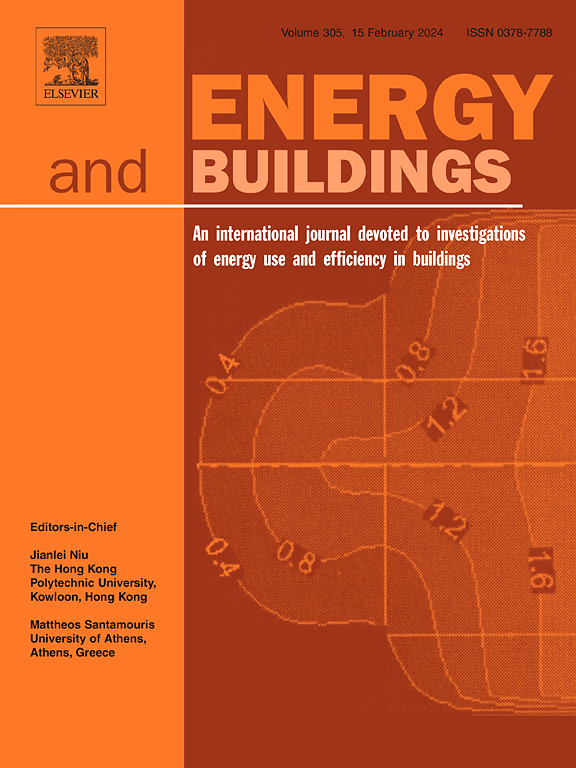Predicting long-term urban overheating and their Mitigations from nature based solutions using Machine learning and field measurements
IF 6.6
2区 工程技术
Q1 CONSTRUCTION & BUILDING TECHNOLOGY
引用次数: 0
Abstract
Urban overheating has become a global issue, exacerbated by climate change and leading to serious risks for public health and urban sustainability. Traditional methods, such as numerical simulations and field measurements, often face challenges due to uncertainties in input data. This study predicts the longevity and severity of future urban overheating by integrating field measurements with machine learning (ML) models, focusing on the impact of urban greening under different global warming (GW) scenarios. Field measurements were conducted from June 15 to September 14, 2024, at an office campus in Ottawa (a cold climate zone). Microclimate data was collected at four locations featuring distinct vegetation coverage: a large lawn area without trees (Lawn), a parking plot with no greening (Parking), a greenery area with sparsely distributed trees (Tree), and a forested area with 100 % tree coverage (Forest). Models—including Artificial Neural Networks (ANN), Recurrent Neural Networks (RNN), and Long Short-Term Memory (LSTM) networks—were trained on local climate data, with LSTM demonstrating superior accuracy. Four GW scenarios aligned with Shared Socioeconomic Pathways for 2050 and 2090 were examined. Results show that the Universal Thermal Climate Index (UTCI) at the Parking plot could increase from about 27 °C under GW1.0 to 31 °C under GW3.5. Low health risk (UTCI > 26 °C) is projected to rise at all sites, while dense tree coverage effectively prevents extremely high-risk conditions (UTCI > 38.9 °C). These findings underscore the importance of urban greening in mitigating severe thermal stress and enhancing outdoor comfort under future climates.
利用机器学习和实地测量预测长期城市过热及其缓解措施
城市过热已成为一个全球性问题,气候变化加剧了这一问题,并给公共健康和城市可持续性带来严重风险。由于输入数据的不确定性,数值模拟和现场测量等传统方法经常面临挑战。本研究通过将现场测量与机器学习(ML)模型相结合,重点研究了不同全球变暖(GW)情景下城市绿化的影响,预测了未来城市过热的持续时间和严重程度。现场测量于2024年6月15日至9月14日在渥太华(寒冷气候区)的一个办公园区进行。小气候数据采集地点为植被覆盖度不同的4个地点:无树木的大草坪区(lawn)、无绿化的停车场(parking)、树木稀疏的绿化区(Tree)和树木覆盖率100%的森林区(Forest)。模型——包括人工神经网络(ANN)、循环神经网络(RNN)和长短期记忆(LSTM)网络——在当地气候数据上进行了训练,LSTM显示出更高的准确性。研究了与2050年和2090年共享社会经济路径相一致的四种GW情景。结果表明:GW1.0条件下,停车场的通用热气候指数(UTCI)可由27℃左右增加到31℃;低健康风险(UTCI >;26°C),预计所有站点的气温都将上升,而茂密的树木覆盖有效地防止了极端高风险的情况(UTCI >;38.9°C)。这些发现强调了城市绿化在未来气候条件下减轻严重热应力和提高室外舒适度方面的重要性。
本文章由计算机程序翻译,如有差异,请以英文原文为准。
求助全文
约1分钟内获得全文
求助全文
来源期刊

Energy and Buildings
工程技术-工程:土木
CiteScore
12.70
自引率
11.90%
发文量
863
审稿时长
38 days
期刊介绍:
An international journal devoted to investigations of energy use and efficiency in buildings
Energy and Buildings is an international journal publishing articles with explicit links to energy use in buildings. The aim is to present new research results, and new proven practice aimed at reducing the energy needs of a building and improving indoor environment quality.
 求助内容:
求助内容: 应助结果提醒方式:
应助结果提醒方式:


